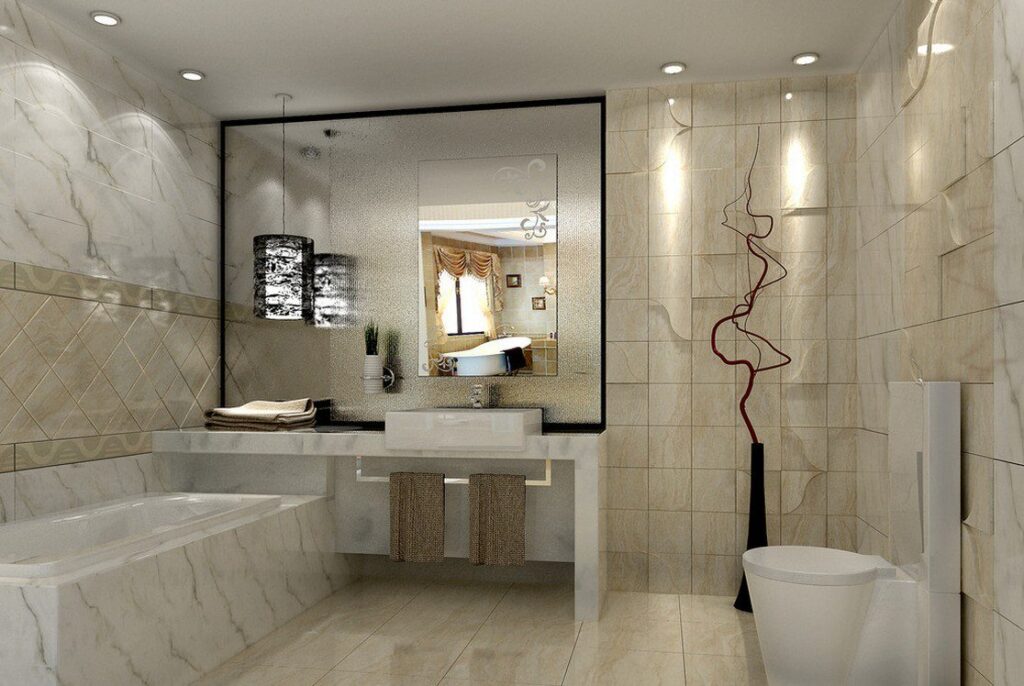
One of the most aesthetically undesirable rooms in the house is an old bathroom. Unlike a bedroom where a fresh coat of paint can transform the room in a day, a bathroom remodel might require a plumber, a tile installer, a carpenter, and an electrician as well.
Due to cost and complexity, the bathroom often ranks low on the list for renovation. However, an outdated bathroom is not only harsh on the eyes, it also wastes a significant amount of water, uses more energy than necessary, and can give your home less than stellar indoor air quality.
There have been amazing innovations in bathroom fixtures since the days of pink toilets, which means a bathroom remodel can drastically reduce your ecological footprint and lower your utility bills, too.
With so many things to consider, it can seem overwhelming. So here’s a green bathroom remodel checklist to ensure that when you tackle this project, it’s done right.
According to the US Energy Information Administration, about 18 percent of the energy you use at home is for water heating. Although the water heater isn’t technically in the bathroom, replacing it with a more efficient model should be part of a green bathroom remodel, if possible.
The latest highly efficient alternative works like a reverse air conditioner; the heat is extracted from the air and used to heat the refrigerant that heats the water.
These electric systems are much more efficient than gas water heaters and work well for both new construction and remodels. You can even get models that use CO2 as a refrigerant, which is much safer for the ozone layer.
These heat water as you use it instead of storing it like a conventional one. According to a Consumer Reports article, gas tankless water heaters consume 22% less energy than traditional gas storage heaters.
These water heaters are up to 96 percent efficient! They are similar to a conventional water heater in appearance, but instead of losing heat through the vent, the condensing storage water heater captures the exhaust and pushes it through heating coils inside the heater creating more hot water with less energy.
Solar water heaters can reduce water heater energy costs by 50 percent. They work in any environment, and the fuel they consume (the sun!) is absolutely free.
You’ll likely need a backup system for cloudy days, so your upfront costs will be higher, but it’ll be worth it in the long run.
The newer Energy Star exhaust fan models use less electricity, are quieter, use humidity sensors for efficient performance, and clean the air faster. That not only prevents the mirror from fogging up, but also prevents damage that moisture can cause, such as promoting mold and mildew.
Make sure you have the fan vented outside the house and not just into your attic to improve air quality throughout your home.
Tile is a common feature of bathroom floors and walls and there are tons of options these days that are eco-friendly. Most are made up of recycled components, and there are a variety of aesthetics to pick from. Consider bamboo, cork, or natural materials if you want something a little uncommon.
VOCs are volatile organic compounds, which are chemical substances emitted as gases from thousands of different types of products (as well as biogenic sources such as pine, citrus, and freshly cut grass).
Household cleaning products, cosmetics, new furniture, varnishes, and paints, just to name a few, release VOCs. While not all VOCs are bad, some have short-term and/or long-term health impacts.
The first thing to consider is water consumption. Unless you water your lawn daily, the vast majority of your home’s water use comes from your bathroom.
It’s easy to find faucets, toilets, and showerheads specially designed to use minimal amounts of water. Over time, these fixtures will create a significant reduction in your home’s overall water use.
The bathroom is often the place where family members hang out. It is often the place where family members spend a lot of time in front of the mirror.
Whether it’s grooming or putting on makeup, these activities will require an adequate amount of light to see yourself clearly in the mirror.
To minimize energy consumption, consider installing skylights or solar tunnels to help offset the need for artificial lighting in the bathroom.
When choosing flooring and countertop materials, consider going for natural, renewable options like bamboo, reclaimed wood, hemp, and concrete.
The more natural materials that are used in your bathroom remodel, the less environmental impact that will result from your project.
Greywater is soft-use water that is collected from your home’s sinks, bathtubs, showers, and washing machines. When properly collected and stored, greywater can be a very environmentally friendly way to irrigate your home lawn.
Most construction debris cannot be reused, but if the fixtures are in good condition, they can be reused. Post the vanity, sink, faucets, and even the toilet on an online free market site. Craigslist also has a free section where you can list your pieces.
Many cities have salvage stores that will accept donations of your used home furnishings and building materials; some will even pay for them. Although you may be tired of that pink toilet, maybe there is someone who would love to have it!
Ready to design the bathroom of your dreams? We at K Remodeling are ready to do that for you. Get a free quote from K Remodeling and get started. Give us a call.